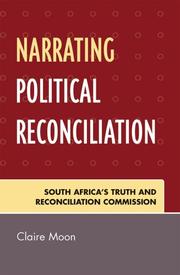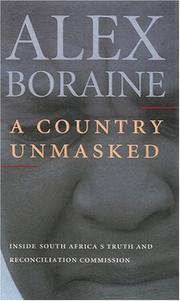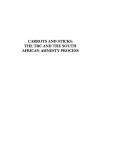| Listing 1 - 10 of 12 | << page >> |
Sort by
|
Periodical
Year: 2009 Publisher: Ottawa, Ontario : Indian Residential Schools Truth and Reconciliation Commission Secretariat,
Abstract | Keywords | Export | Availability | Bookmark
 Loading...
Loading...Choose an application
- Reference Manager
- EndNote
- RefWorks (Direct export to RefWorks)

ISBN: 9780739121276 0739121278 Year: 2008 Publisher: Lanham : Lexington Books,
Abstract | Keywords | Export | Availability | Bookmark
 Loading...
Loading...Choose an application
- Reference Manager
- EndNote
- RefWorks (Direct export to RefWorks)
Apartheid --- Human rights --- Reconciliation --- Truth commissions --- Blacks --- Segregation --- Commissions, Truth --- Reconciliation commissions --- Governmental investigations --- Political aspects --- Evaluation --- South Africa. --- Commission for Truth and Reconciliation (South Africa) --- South African Truth Commission --- TRC --- Truth and Reconciliation Commission (South Africa) --- South Africa --- Politics and government --- Black people --- Afrique du Sud. Truth and reconciliation commission --- Réconciliation --- Justice restaurative --- Aspect politique --- Afrique du Sud

ISBN: 0195718054 Year: 2000 Publisher: Cape Town : Oxford University Press,
Abstract | Keywords | Export | Availability | Bookmark
 Loading...
Loading...Choose an application
- Reference Manager
- EndNote
- RefWorks (Direct export to RefWorks)
Apartheid --- -Reconciliation --- -South Africa --- -#KVHA:Geschiedenis; Zuid-Afrika --- Peace making --- Peacemaking --- Reconciliatory behavior --- Quarreling --- Separate development (Race relations) --- Segregation --- Anti-apartheid movements --- Post-apartheid era --- Political aspects --- -Race relations --- South Africa. Truth and Reconciliation Commission --- Reconciliation --- #KVHA:Geschiedenis; Zuid-Afrika --- Blacks --- South Africa. --- Commission for Truth and Reconciliation (South Africa) --- South African Truth Commission --- TRC --- Truth and Reconciliation Commission (South Africa) --- South Africa --- Race relations. --- Race question --- Black people
Book
Year: 2019 Publisher: Berlin/Germany Logos Verlag Berlin
Abstract | Keywords | Export | Availability | Bookmark
 Loading...
Loading...Choose an application
- Reference Manager
- EndNote
- RefWorks (Direct export to RefWorks)
This book focuses on six post-apartheid novels, namely Zo¨e Wicomb's ''Playing in the Light'' (2006), Marlene van Niekerk's ''Agaat'' (2004/2007), André Brink's ''Devil's Valley'' (1998), Sarah Penny's ''The Beneficiaries'' (2002), K Sello Duiker's ''Thirteen Cents'' (2000), and Kgebetli Moele's ''Room 207'' (2006). It aims at highlighting different manifestations of melancholia that are visible in these texts in particular and in post-apartheid writing more generally. Mainly based on Sigmund Freud's, Anne Cheng's, and Paul Gilroy's concepts of melancholia, most novels are regarded as melancholic counter-narratives to the South African Truth and Reconciliation Commission's attempt to initiate a nationwide process of mourning with the aim of subsequent closure of the apartheid past. Moreover, concepts of melancholia prove particularly useful in order to analyse issues such as complicity, uncritical whiteness, crises of identity, forms of resistance, and intergenerational memory.
Melancholy in literature --- Postcolonialism in literature --- Identity (Philosophical concept) in literature --- South African fiction. --- Südafrika --- Postapartheid Literatur --- Postkoloniale Literatur --- Truth and Reconciliation Commission --- Melancholie --- South Africa --- In literature.
Dissertation
Year: 2023 Publisher: Liège Université de Liège (ULiège)
Abstract | Keywords | Export | Availability | Bookmark
 Loading...
Loading...Choose an application
- Reference Manager
- EndNote
- RefWorks (Direct export to RefWorks)
This work explores Marion Campbell's redefinition of identity as she discovers that her parents passed as white during apartheid, and at a time when the Truth and Reconciliation Commission hearings attract national attention. This analysis is tighlty linked to the notions of "racial" and cultural identies, to the concept of place, and to Michael Rothberg's concept of the implicated subject.
racial passing --- identity --- South Africa --- post apartheid --- coloured identities --- self --- identity construction --- Truth and Reconciliation Commission --- implicated subject --- Arts & sciences humaines > Littérature
Book
Year: 2022 Publisher: Baden-Baden
Abstract | Keywords | Export | Availability | Bookmark
 Loading...
Loading...Choose an application
- Reference Manager
- EndNote
- RefWorks (Direct export to RefWorks)
In the context of comparative legal history, the South African Truth and Reconciliation Commission is contrasted with the Study Commission for Working Through the History and the Consequences of the SED Dictatorship in Germany. In an extensive examination, central aspects of the commissions' mandates and their implementation are analyzed, thus providing a deeper understanding of the two truth commissions. Whilst the final reports of the commissions serve as a central source, personal interviews with experts in transitional justice and contemporary witnesses from South Africa are also included in the work. Im Rahmen der vergleichenden Rechtsgeschichte wird die südafrikanische Wahrheits- und Versöhnungskommission der Enquete-Kommission zur Aufarbeitung von Geschichte und Folgen der SED-Diktatur in Deutschland gegenübergestellt. In einer eingehenden Untersuchung werden zentrale Aspekte der Kommissionsmandate und ihrer Umsetzungen durch die Kommissionen analysiert und so ein tieferes Verständnis der beiden Wahrheitskommissionen vermittelt. Dabei werden nicht nur die Abschlussberichte der Kommissionen als zentrale Grundlage herangezogen. Es finden auch persönliche Interviews mit Expert:innen der Transitional Justice und Zeitzeug:innen aus Südafrika Eingang in die Arbeit.
LAM --- Aufarbeitung von Unrecht, Demokratie, Diktatur, Kollektiver Schlussstrich, Lustration, Menschenrechtsverletzung, Opferentschädigung, Politischer Umbruch, Staatliche Verbrechen, Stasi-Unterlagen, Transitional Justice, Unrechtsaufarbeitung, Vergangenheitsbewältigung, Wahrheitssuche, Wiedergutmachung, Wahrheitskommission, Aufarbeitung, South African Truth and Reconciliation Commission, Enquete-Kommission

ISBN: 9050954006 Year: 2004 Publisher: Antwerp Oxford Intersentia
Abstract | Keywords | Export | Availability | Bookmark
 Loading...
Loading...Choose an application
- Reference Manager
- EndNote
- RefWorks (Direct export to RefWorks)
Human rights --- Criminal law. Criminal procedure --- National movements --- South Africa --- Amnesty --- Political crimes and offenses --- Truth commissions --- Commissions, Truth --- Reconciliation commissions --- Governmental investigations --- Offenses, Political --- Political offenses --- Crime --- Extradition --- Political violence --- Subversive activities --- South Africa. --- Commission for Truth and Reconciliation (South Africa) --- South African Truth Commission --- TRC --- Truth and Reconciliation Commission (South Africa) --- Offenses against the State --- State, Offenses against the --- Droit pénal --- Extinction des peines --- Afrique du sud --- Amnistie
Book
ISBN: 1800344805 1800349262 1800858426 Year: 2021 Publisher: Liverpool Liverpool University Press
Abstract | Keywords | Export | Availability | Bookmark
 Loading...
Loading...Choose an application
- Reference Manager
- EndNote
- RefWorks (Direct export to RefWorks)
"An Open Access edition of this book will be made available on the Liverpool University Press website and the OAPEN library on publication.Improvising Reconciliation is prompted by South Africa’s enduring state of injustice. It is both a lament for the promise with which non-racial democracy was inaugurated and, more substantially, a space within which to consider its possible renewal. As such, this study lobbies for an expanded approach to the country’s formal transition from apartheid in order to grapple with reconciliation’s ongoing potential within the contemporary imaginary. It does not, however, presume to correct the contradictions that have done so much to corrupt the concept in recent decades. Instead, it upholds the language of reconciliation for strategic, rather than essential, reasons. And while this study surveys some of the many serious critiques levelled at the country’s Truth and Reconciliation Commission (1996-2001), these misgivings help situate the plural, improvised approach to reconciliation that has arguably emerged from the margins of the cultural sphere in the years since. Improvisation serves here as a separate way of both thinking and doing reconciliation. It recalibrates the concept according to a series of deliberative, agonistic and iterative, rather than monumental, interventions, rendering reconciliation in terms that make failure a necessary condition for its future realisation."
Confession. --- Reconciliation --- Social aspects --- Political aspects --- South Africa. --- South Africa --- Race relations. --- Peace making --- Peacemaking --- Reconciliatory behavior --- Quarreling --- Auricular confession --- Church discipline --- Forgiveness of sin --- Absolution --- Penance --- Commission for Truth and Reconciliation (South Africa) --- South African Truth Commission --- TRC --- Truth and Reconciliation Commission (South Africa) --- Race question --- South Africa;transition;drama;theatre;film;stage;Marc Kaplin;democracy;Truth;Commission;performance;separation;Farber;Ingrid Gavshon;Ramadan Suleman;justice;human rights

ISBN: 0521802199 0521001943 1107122988 9786612486517 0511673671 0511674864 0511672888 0511670338 0511522290 1282486519 051167161X 9780521802192 9780521001946 9780511674860 9780511671616 9780511670336 9780511522291 9781107122987 9781282486515 6612486511 9780511673672 9780511672880 Year: 2001 Publisher: Cambridge ; New York : Cambridge University Press,
Abstract | Keywords | Export | Availability | Bookmark
 Loading...
Loading...Choose an application
- Reference Manager
- EndNote
- RefWorks (Direct export to RefWorks)
The South African Truth and Reconciliation Commission (TRC) was set up to deal with the human rights violations of apartheid during the years 1960-1994. However, as Wilson shows, the TRC's restorative justice approach to healing the nation did not always serve the needs of communities at a local level. Based on extended anthropological fieldwork, this book illustrates the impact of the TRC in urban African communities in Johannesburg. While a religious constituency largely embraced the commission's religious-redemptive language of reconciliation, Wilson argues that the TRC had little effect on popular ideas of justice as retribution. This provocative study deepens our understanding of post-apartheid South Africa and the use of human rights discourse. It ends on a call for more cautious and realistic expectations about what human rights institutions can achieve in democratizing countries.
Reconciliation --- Post-apartheid era --- Political aspects --- South Africa --- Politics and government --- Apartheid --- Retribution. --- Human rights --- Criminal law. Criminal procedure --- National movements --- Race relations --- Retribution --- #SBIB:328H413 --- #SBIB:39A11 --- #SBIB:39A73 --- Social exchange --- Punishment --- Revenge --- Blacks --- Segregation --- Instellingen en beleid: Zuid-Afrika --- Antropologie : socio-politieke structuren en relaties --- Etnografie: Afrika --- South Africa. --- Commission for Truth and Reconciliation (South Africa) --- South African Truth Commission --- TRC --- Truth and Reconciliation Commission (South Africa) --- Race relations. --- Race question --- Black people --- Law --- General and Others --- Reconciliation - Political aspects - South Africa --- Post-apartheid era - South Africa --- Apartheid - South Africa --- South Africa - Politics and government - 1994 --- -South Africa - Race relations
Book
ISBN: 9781461452959 Year: 2013 Publisher: New York : Springer,
Abstract | Keywords | Export | Availability | Bookmark
 Loading...
Loading...Choose an application
- Reference Manager
- EndNote
- RefWorks (Direct export to RefWorks)
Remaking Transitional Justice in the United States explores rhetorical attempts to authorize the Greensboro Truth and Reconciliation Commission—a grassroots initiative established in Greensboro, North Carolina in 2004 to investigate a traumatic and controversial event in the city’s past. The book demonstrates that the field of transitional justice has given rise to a transnational rhetorical tradition that provides practitioners with resources to act in their own particular contexts. It then shows, through detailed analyses, how the Greensboro commissioners and their advocates made use of this rhetorical tradition in their attempts to establish the Commission’s authority in the community. Calling attention to the rhetorical moves shared among those working in the field of transitional justice, this study offers insights into the development of transitional justice in the United States and other liberal democracies. This book is relevant to scholars and practitioners of transitional justice as it describes mechanisms of transitional justice that are frequently overlooked: rhetorical mechanisms. It also speaks to any readers interested in the communicative strategies of truth commissions.
Philosophy --- Cognitive psychology --- Psychology --- Social psychology --- Politics --- Psychology and law --- Law --- Personality development --- psychologie --- sociale psychologie --- filosofie --- politiek --- recht --- bewustzijn --- persoonlijkheidsontwikkeling --- Psychology. --- Personality. --- Social psychology. --- Political science. --- Law and Psychology. --- Personality and Social Psychology. --- Political Science. --- Administration --- Civil government --- Commonwealth, The --- Government --- Political theory --- Political thought --- Science, Political --- Social sciences --- State, The --- Mass psychology --- Psychology, Social --- Human ecology --- Social groups --- Sociology --- Personal identity --- Personality psychology --- Personality theory --- Personality traits --- Personology --- Traits, Personality --- Individuality --- Persons --- Self --- Temperament --- Behavioral sciences --- Mental philosophy --- Mind --- Science, Mental --- Human biology --- Soul --- Mental health --- Greensboro Truth & Reconciliation Commission. --- Greensboro Truth and Reconciliation Commission --- Truth and Reconciliation Commission (Greensboro, N.C.) --- Greensboro Truth & Community Reconciliation Project. --- Transitional justice
| Listing 1 - 10 of 12 | << page >> |
Sort by
|

 Search
Search Feedback
Feedback About UniCat
About UniCat  Help
Help News
News